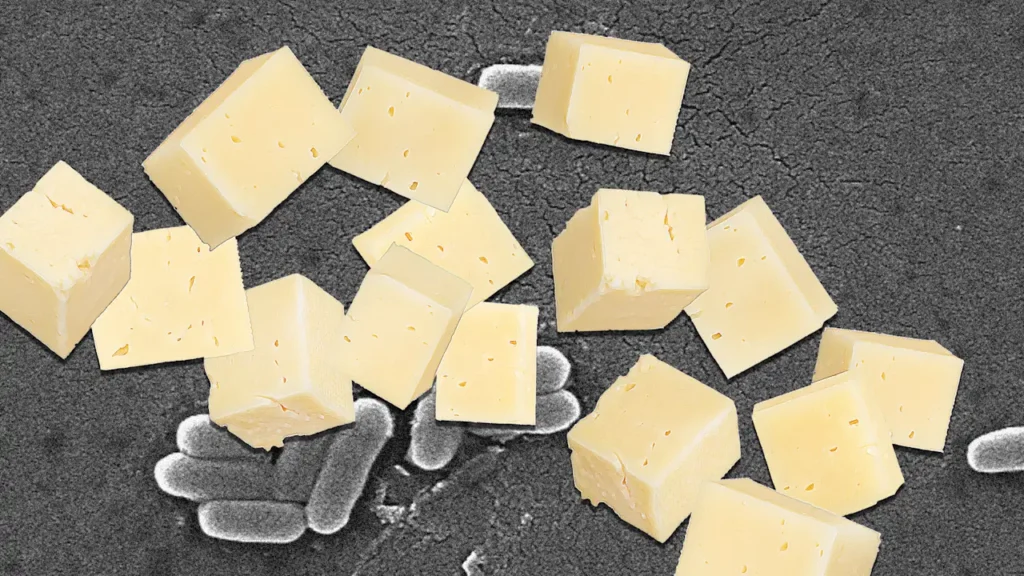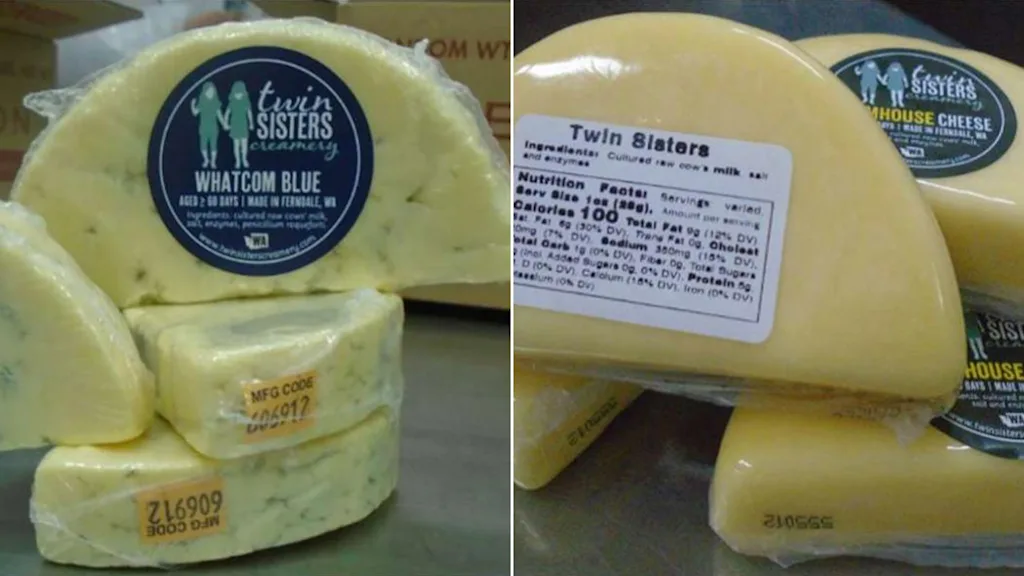
Multiple Twin Sisters Creamery cheese products have been recalled following an E. coli outbreak in Washington and Oregon. To date, two adults and one child have reported illnesses linked to the outbreak.
On October 25, 2025, Twin Sisters Creamery recalled Whatcom Blue, Farmhouse, Peppercorn, and Mustard Seed varieties of its 2.5-pound round cheese wheels. The cheese wheels were sent to distributors in Washington and Oregon. Some products were further distributed to retail stores for repacking or sold as pre-cut, half-moon-shaped pieces.
The products are made with raw, unpasteurized milk and may be contaminated with Shiga toxin-producing Escherichia coli (STEC) and Escherichia coli O103.
Third-party testing of Farmhouse cheese samples confirmed the presence of E. coli O103. Whatcom Blue samples analyzed by the FDA and the Washington State Department of Agriculture tested positive for E. coli STEC.
On October 26, 2025, Washington State-based food distributor Peterson Company recalled half-moon-shaped pieces of Farmhouse, Whatcom Blue, and Twin Sisters Creamery cheeses after Twin Sisters Creamery notified them of the three reported STEC infections.
The FDA published the Twin Sisters Creamery and Peterson Company recall notices on October 27, 2025. Here’s what you need to know.

Which products are included in the recalls?
The following Twin Sisters Creamery products have been recalled:
- 2.5-pound Whatcom Blue cheese wheels
- 2.5-pound Farmhouse cheese wheels
- 2.5-pound Peppercorn cheese wheels
- 2.5-pound Mustard Seed cheese wheels
- Roughly 5 to 6-ounce half-moon-shaped pieces of Whatcom Blue cheese
- Roughly 5 to 6-ounce half-moon-shaped pieces of Farmhouse cheese
The 2.5-pound round cheese wheels were shipped to distributors in Washington and Oregon between July 27, 2025, and October 22, 2025. The cheese wheels may also have been further distributed to retail stores for repacking or sold as pre-cut, half-moon-shaped cheese pieces with different lot numbers and expiration dates.
The recalled 2.5-pound round cheese wheels have the following batch codes:
- Batch Code 250527B Whatcom Blue
- Batch Code 250610B Whatcom Blue
- Batch Code 250618B Whatcom Blue
- Batch Code 250624B Whatcom Blue
- Batch Code 250603F Farmhouse
- Batch Code 250616B Farmhouse
- Batch Code 250603P Peppercorn
- Batch Code 250616M Mustard Seed
The recalled half-moon-shaped cheese pieces were packaged in clear wrap and distributed to retailers and food businesses, including caterers, distributors, and restaurants, in Colorado, Idaho, Oregon, and Washington between August 14, 2025, and October 24, 2025.
They have the following manufacturer codes printed or them or on a sticker:
- Item# 28855 Whatcom Blue – MFG Code 793511
- Item# 28855 Whatcom Blue – MFG Code 781511
- Item# 28855 Whatcom Blue – MFG Code 775511
- Item# 28855 Whatcom Blue – MFG Code 761511
- Item# 29608 Farmhouse – MFG Code 765511
- Item# 29608 Farmhouse – MFG Code 752511
- Item# 29608 Farmhouse – MFG Code 738511
- Item# 29608 Farmhouse – MFG Code 726511
Do not consume the recalled products.
Consumers who have purchased any of the recalled products should return them to the place of purchase for a full refund.
If you have questions, call Twin Sisters Creamery at 360-656-5240 or Peterson Company at (800) 735-0313, extension 2101.
Three infections linked to the E. coli outbreak
There have been three reports of STEC infections caused by E. coli O103 to date, one in Oregon and two in Washington. One of the three reported infections involved a young child.
An infected Oregon resident consumed Twin Sisters Creamery Farmhouse cheese before becoming ill. The Washington State Department of Health, Oregon Health Authority, and federal authorities are investigating the outbreak.
E. coli can cause STEC infections
You can get an STEC infection by eating foods contaminated by E. coli.
Symptoms may include diarrhea, stomach cramps, or blood in the stool. Symptoms typically appear 1 to 10 days after exposure.
The FDA recall notices explain that STEC infection can lead to Hemolytic Uremic Syndrome (HUS), which is a life-threatening condition that can cause kidney failure and have fatal complications. HUS is particularly dangerous for young children, elderly adults, and immunocompromised people.
